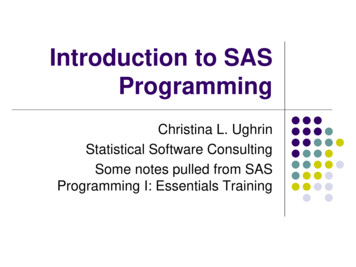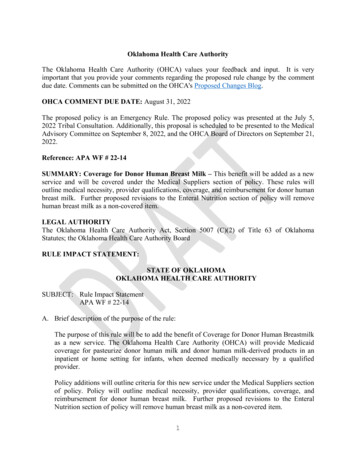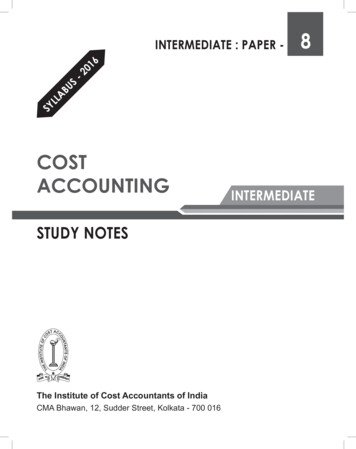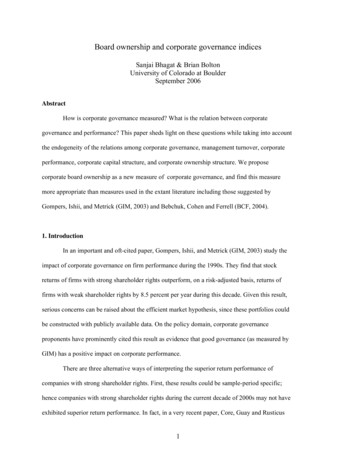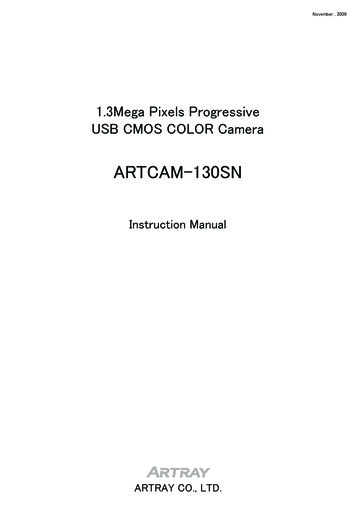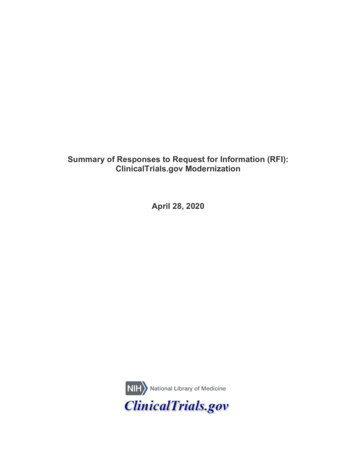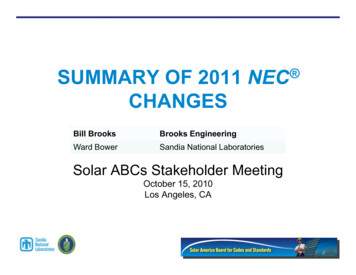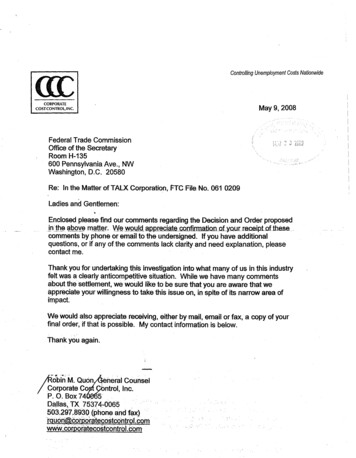
Transcription
Controlling Unemployment Costs NationwideMay 9,2008.Federal Trade CommissionOffice of the SecretaryRoom H-135600 Pennsylvania Ave., NWWashington, D.C. 20580Re: In the Matter of TAW Corporation, FTC File No. 061 0209Ladies and Gentlemen:Enclosed please find our comments regarding the Decision and Order proposedin @-eabove matter. We would appreciate confirmatio nfy aucre tsfmcomments by phone or m a i l to the undersigned. If you have additionalquestions, or if any of the comments lack clarity and need explanation, pleasecontact me.Thank you for undertaking this investigation into what many of us in this industryfelt was a clearly anticompetitive situation. While we have many commentsabout the settlement, we would like to be sure that you are aware that weappreciate your willingness to take this issue on, in spite of its narrow area ofimpact.We would also appreciate receiving, either by mail, email or fax, a copy of yourfinal order, if that is possible. My contact information is below.Thank you again.ioxobin Mi Quon eneral CounselCorporate Control, lnc.74&Dallas, TX 75374-0065503.297.8930(phone and fax)iauori@cornorate o control. mwww.corporatecostcoi trol.com
United States of AmericaBefore Federal Trade Commission1In the Matter of1TALX Corporationa corporation1Docket No. C-0610209Public Comment on Consent Agreement)Corporate Cost Control, Inc., a Designated UCM Services Provider pursuant to Section I(P) ofthe Decision and Order, would submit the following comments on the proposed ConsentAgreement.1.Corporate Cost Control meets the definition of a Designated UCM Services Provider insubsection 2 of Section I(P) of the order in that: it is neither TALX nor ADP; it has neversubcontracted anything to TALX nor has it been in any relationship with such a subcontractor;and it provides within the jurisdiction of all fifty states the types of setvices listed in (c) of thatsection to several Major Multi State Employers having more than 3500 employees in multiplestates. We would provide the identity of those clients confidentially upon FTC request.Corporate Cost Control should be listed in subsection 1 of I(P) as one of the named providers.2.The provision of II(C) of the Order states that the purpose of the Order is to facilitateentry and expansion of firms in the UCM industry, and to remedy the lessening of competition inthis industry. The only remedies posed in the Order fall short of resolving the existing monopolyin this industry; they simply mildly reprimand an organization that in a conscious, premeditatedand publicly acknowledged manner set out to eliminate all effective competition. The remediesin this Order are inadequate in light of the impact of this history on the industry. Additionally,relying on the addition of 1OM in market share nationwide to other firms in the industry doesnot alter the concentrated nature of this industry for the future.3.Assuming without knowledge that the assertion in the documentation that TALXysUCMbusiness was valued at 270 Million (4/28/08 Press release), the impact of possible loss of only 10 Million in contract value is at best a reprimand rather than a penalty for the egregiouscombination of entities that resulted in this company. The indication in the Analysis that thisgrants "the majority of TALX's long term contract customersyyrelief fiom the extended nature oftheir agreement is surprising; we believe that after its fmal acquisition, TALX went to virtuallyall of its customers and required signature on five-year agreements. It is hard to believe that only3.7% ( 1OM/ 27OM) of their customers acceded. Nothing in this Order precludes them fromcontinuing that process in the near W e , either: in fact the definition of Long Term ContractCustomer in I(X)(l) specifically eliminates contracts with effective dates after the date of thisOrder. Thus TALX has achieved the best of both worlds: it can avoid notification to customerswith a one year agreement, await the jinality of this Order, and seek similarly anticompetitive
five year agreements fkom those customers not covered by I(Q(1). In fact, we have becomeaware that TALX has done just that in a current sales situation: their proposal delivered in thelast week included a five year agreement. They do not plan to change their methodologies. Abetter remedy for this situation should be to r e q r e TALX to treat all of its contracts as one yearagreements with 30 day cancellation provisions, for any or no reason. If their service and theirpricing is truly competitive, they will retain the business. That would solve any issue of the''personal nature" of this industry, discussed in the Analysis as a basis for the FTC not requiringdivestiture in this case.4.The fact of TALX's ownership of the VOlE and UCM businesses is not sufficientlyaddressed in this Order. The VOIE business is highly profitable: they are able to charge thecustomer employer for maintaining the data historically provided to the UCM service provider aspart of the UCM service; and then they additionally charge the inquirer (mortgage company,landlord, etc.) a substantial amount to access the information. The wst of storing andmaintaining that idormation is tiny: they must have recouped their initial development costsmany times over by now. But what this combination does is place them in a unique position inthe UCM world: they can nearly give away the UCM service in order to get the more lucrativeVOIE contract. For those companies who do not have in-house VOIE, this makes a very highhurdle when the employer is offered both s e c ebys TALX. Requiring divestiture of either theVOlE or the UCM portion of the business would remedy this effect; alternatively, the FTC oouldrequire TALX to divest any UCM contracts to whom they provide VOIE, and not jointly sell theproducts in the future.The final acquisition of Employers Unity, Inc., far exceeded the usual value of suchorganizations, and was possible simply because of TALX's earlier near-monopolization of themarket. An offer to purchase Employers Unity, Inc., had been made early in the pathway tocomplete monopolization. It was initially rejected, however, when nearly double the normalprice for a business in this industry was later offered to the owner of Employers Unity, it wasimpossible for him not to accede. The increased price offered was enabled by the hugeprofitability of TALX's VOIE program. During the period between TALX's initid acquisitionsand November of 2006, hundreds of clients had switched fkom the newly created TACX toEmployers Unity because they did not like TALXYssenice. While decreased, some competitionstill existed for d l sizes of accounts. However, once that acquisition occurred, as theCommission is acknowledging by this Order, the consolidation was complete. This Order allowsthe continued existence of this enormous conglomemtion, and gives small comfort to thosebasically regional firms struggling to compete. It does not give large employers any choice incompanies that have the wherewithal to manage sizeable accounts (Fortune 100 or 500companies), as Employers Unity did. A client-centered remedy for this accretion should be thedivestiture of some part of this business, rather than simply dowing a meager 3.7% of theTALX's clients to opt out of their contracts early, for just the corning three years.5.6.The provision in III(I3) that permits TALX to re-bid if a Long Term Contract Customerhas opted to take the 90 day out is very harmful to competition. A very possible re-bid scenariois that TALX will simply cut the price on the service so deeply, either because of its deeppockets, because it has already inflated the price of the services due to the lack of competition, orbecause it is already making substantial amounts on the VOIE senices, that the client cannot
make the switch. Once the employer opts to take the 90 day out, TALX should be precluded&omsales efforts for at least a year, or should have a limit as to the discount it can take on itsoriginal contract price (e.g., it can only offer to meet the price, not surpass it).7.While the limitation on enforcement of non-compete and non-solicitation provisions isappropriate, we would question the degree to which this is in fact a penalty to TALX. We wouldquestion whether TALX at any time has taken steps to enforce any non-compete or nonsolicitation agreements it has entered into with Relevant Past Persons or Relevant CurrentPersons. If there is no evidence of active prosecution of such individuals on the basis of suchclauses, this is another mere reprimand rather than a serious penalty.8.The Order in Section II(B) limits the restriction on enforcement to a period of two years.In light of the fact that this Order does not alter the basic fact of monopolization of this industryby TALX, two years is a very short period. Additionally, the limitation of the option to leavewithout restriction to the first ten of one type of employee, the first four of another, etc. makeslittle sense other than as TALX's acceptance of the actual fact that, statistically, they willprobably lose 46 employees over the next two years. Coupled with what we believe to be a lackof enforcement of the restrictive clauses in their employment agreements, this simply means thatbusiness will continue as usual for two years, and after that, everyone who still is at TALX willdoubly fear leaving. This is confinned by the provision in V that reiterates TAIX's continuedability to engage in restrictive covenants with its employees. TALX should also be required tomake an unusually full disclosure of the impact of signing such restrictions to any newemployee, along with being required to not discriminate in hiring or other employment actionagainst individuals who refuse to sign such limitations.9.It is also inappropriate that no highlevel managers or salespeople are included in theAppendix F Employee List. It is to be expected, with TALX's extremely high degree of marketpenetration, that many salespeople would be eager to move to a competitor where the universe ofprospects is greater, and commission opportunities more substantial. In addition, the DesignatedUCM Services Providers need to hire such experienced managers and sales people in order toobtain and service the 10Min business that should become available. Were this to truly be apenalty to TALX, there should be no restriction on the classification of employee who canescape the provisions; and there should be no time limit.10.During the past two years, Corporate Cost Control has taken a few clients from TALX.In each case we have requested a final report on the client's account; in virtually none have wereceived it. This information is crucial to being able to effectively represent the new client. Infact, this data is the property of the client. Provisions in TALX agreements indicating to thecontrary should be precluded fbm having effect by the FTC. This type of limitation simply putsup another barrier to switching to a new service. TALX should be required to provide the newservice provider with as much information as TALX would have provided its client, and itshould be required to be provided timely. Nothing in the Order's Section IV specifies thetimeliness of this provision of information: if it is not timely, it is not useful. With TALX'ssubstantial computerization, they should be able to produce this data witbin 30 days ofnotification. Additionally, as recognized in Q, state agencies will continue to senddocumentation to TALX long after a particular client has switched services. TALX should beA
ordered to forward such documentation by fax and overnight mail on the day it receives it to thenew service provider, rather than in any manner and just to the client as provided in (E), since thestate places extreme limitation on the ability of the represented employer to enforce its rights ifresponse is not made within as little as seven days from the date of mailing. Again, sending theinformation to the client and not to the new service provider places another barrier to switchingthat has been used by TALX to convince its clients to remain. The limitation on this section to afive year period is not sufficient: it should be continued until TALX demonstrates that it hasreduced its share of the marketplace to a low enough level that it would not have been subject tothe FTC's concern.11.The provision of VI(B) requiring notice only to Long Term Contract Customers limits animportant part of what should result from TALX's conduct. All of their clients should be madeaware of this Order, not just the limited group defined as Long Term Contract Customers.12.Without greater knowledge of the ADP/TALX agreement it is hard to comment on theprovisions of VII of the Order; however, it is apparent that there is no requirement that TALXcease its relationship with ADP. Full disclosure to the public of the relationship and its extent(not including pricing, of course) should be required. The fact that this Order permits them tocontinue under the undisclosed terms of the ADPITALX agreement.of June 27,200 1 suggeststhat TALX will be permitted to retain clients provided by ADP. In another recent sales situation,we were aware of a company who was putting out an RFP for UCM services. They r e k d toinclude TALX in the process, because of their dissatisfactonwith the service. However, theydid include ADP, because they were unaware of the fact that ADP's UCM service is simplyTALX. TALX should require ADP to disclose this fact when offering the UCM service if theservice will in fact be provided by TALX.It is not clear how the requirement of allowing Long Term Contract clients to cancel will applyto ADP based relationships, or if it will at all. It is our understanding that frequently ADP offersthe UCM service to its clients as part of a package of services, without a separate bid or fee. Ifthat is the case, and ADP continues to have the relationship it currently has with TALX, it isunlikely that any of those clients will make a change, as it most often is reported to us that ADPcharges no separate fee for the TALX service. This, of course, cannot be true; however, it islikely that ADP is able, due to its exclusive relationship with TALX, to absorb the cost of theTALX fee.13.As to Section VII of the Order, the term 'cprocompetitivebenefit" is used in paragraph A.It would be helpll for this to be defined, as it is hard for us to imagine how any joint venturebetween TALX and any other UCM senice provider might be "procompetitive."14.The appointment of a Monitor/Administrator in this situation is very appropriate.However, while we appreciate Mr. Switzer's previous background as an Attorney General, he isin fact fiom the State of Missouri, in which TALX's headquarters is located. We questionwhether he will be able to be an effective fiduciary for the FTC in light of his roots in that statecoupled with the fact of his being paid by TALX.*
15. In Sections @)(I) and (3) of M the Monitor/Administrator is given the responsibility tomonitor TALX9scompliance with all sections except V. Was that an oversight or intentional? Itwould appear that it should be included. Is there a reason that the Monitor/Administrator is notcharged with informing Negative Option contract holders of their rights as well in Section(d)(5)(a)?16.The requirement of giving notice to Long Term Contract Customers expires after threeyears in I11 and VI(C). What if 10Min contracts have not by that time sought to cancel? Thismeans that the status quo ante will resume after the three year period. If this meager amount ofbusiness cannot be absorbed by the other UCM Service Providers, or if the fact of TALX'sability to come in and re-quote the business at an artificially low price as discussed above, andcompanies do not cancel, we will be in thedexi%tposition we are in today: with a concentrationof the market that is violative of the Acts. At the very least, the time and dollar amount ceilingshould be in the alternative; whichever happens last.17.In VIP), notice to Negative Option Contract Customers is allowed to be included eitheron invoices or in a letter. They should be required to send a letter in all cases; if they wish toinclude it on the invoice (which will likely not be seen by anyone in a decision-making position),that would be nice, but not essential. The provisions of M@) do not incIude the requirementthat this letter be sent to the person identified for notices in the contract or the CEO of the client,as required by I(Q) for Long Term Contract Customers. The companies with Negative Optioncontracts should be treated no differently.In conclusion, our primary concern is that if the remedies are not enhanced to insure an increasein competition, TALX can simply wait out the relatively short time periods, suffer the mildinconvenience of the other sanctions, and continue business as usual without any consequence.This should not be the outcome accepted by the Commission.We would be pleased to testify or provide any other additional documentation or information thatwould assist the Commission in this case.I--CClay Weidman, CEO'Susan CrosbyyYresidentI
United States of America Before Federal Trade Commission 1 In the Matter of 1 Docket No. C-0610209 Public Comment on Consent Agreement TALX Corporation ) a corporation 1 Corporate Cost Control, Inc., a Designated UCM Services Provider pursuant to Section I(P) of the Decision and Order, would submit the following comments on the proposed Consent
